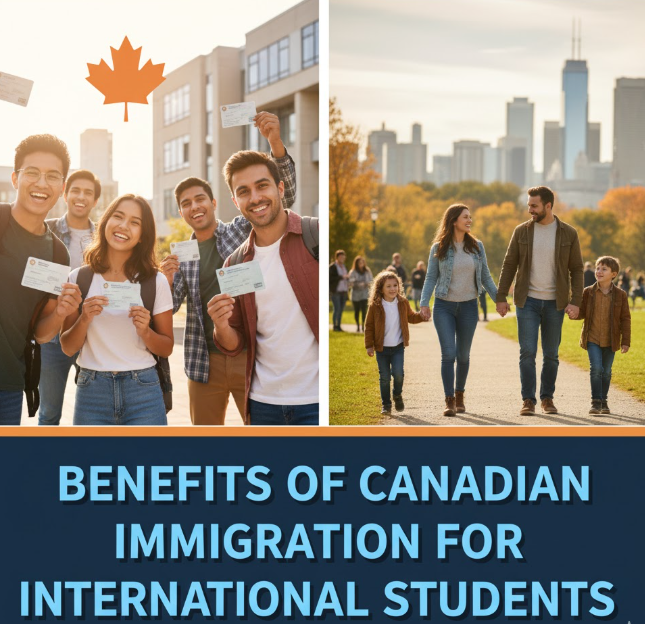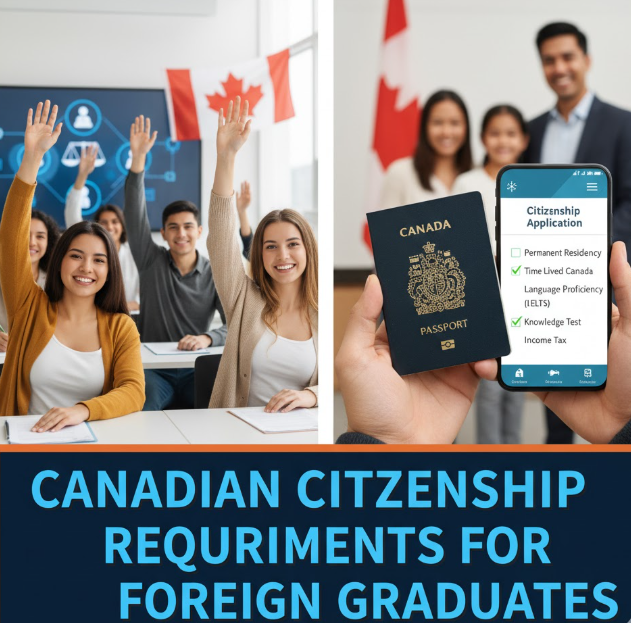Canada has blossomed into one of the most sought-after countries for students around the world. We are home to hundreds of thousands of international students who continue to flock here every year, seeking their fortunes at Canadian colleges and universities. But there is much more to studying in Canada than just attaining a degree – opportunity for immigration that can transform your entire future.
If you ever consider studying in a foreign country, Canada may be the right place for you. This nation opens its arms and heart to international students, with clear pathways for permanent residency. Read on to learn about why coming to Canada for your studies might be one of the best decisions you’ll ever make.
Why International Students Have Flocked to Canada
Canada isn’t just a place to study — it’s a country that genuinely wants international students to stay. Unlike a number of other countries where it is hard to immigrate after you graduate, Canada has built programs specifically aimed at helping foreign graduates transition from temporary resident to permanent resident.
The Canadian government knows that foreign students contribute useful skills, youth, and diversity to Canada. International students who have already studied in Canada know the culture, are fluent in our language and gain Canadian work experience – all factors that make them prime candidates for permanent residency.
Best Immigration Advantages Available to Students in Canada
Post-Graduation Work Permit (PGWP)
Among other benefits of studying in Canada is the Post-Graduation Work Permit. This special permit allows you to work in Canada after graduation without first having a job offer. Here’s what makes it amazing:
The duration of your work permit depends on the length of your study program. Otherwise, if you studied for two years or less, the work permit you receive will have a duration equal to the program. If you studied for two years or longer, you are eligible for a three-year work permit.
This permit is incredibly valuable because it allows you to get Canadian work experience, something that many immigration streams require. You can work for any employer, in any occupation, anywhere in Canada. This flexibility allows you time to develop your career and make a stronger case for immigration.
Multiple Pathways to Permanent Residence
Canada has several immigration programs catered to international students and fresh graduates:
Express Entry System: This is the most common path for skilled workers. With Canadian education backed by work experience, you score more points in the ranking system. Canadian degrees and certificates get you bonus points, and Canadian work experience presents a massive boost for your score.
Provincial Nominee Programs (PNPs): All provinces in Canada have their own immigration program that includes specific streams for foreign students. There are frequent simpler routes through many provinces if you went to school or worked there. In some provinces, you can even apply immediately after graduation without work experience.
Canadian Experience Class (CEC): Designed for graduates who have at least one year of a Canadian work experience. It appreciates your Canadian education and work experience more than if you apply from outside Canada so it’s easier to qualify.
| Immigration Program | Main Requirement | Processing Time | Best For |
|---|---|---|---|
| Express Entry (CEC) | 1 year Canadian work experience | 6 months | Graduates with work experience |
| Provincial Nominee Programs | Varies by province | 6-18 months | Students who studied in specific provinces |
| Quebec Experience Program | Quebec education/work | 12-24 months | Students in Quebec |
| Atlantic Immigration Program | Job offer in Atlantic Canada | 6-12 months | Graduates of Atlantic provinces |
Faster Processing Times
Foreign students who apply from within Canada often have quicker processing times compared with applicants applying from outside Canada. Immigration officers already have your study permit application and you have demonstrated yourself as someone who can be educated in Canada because you graduated.
If you are currently in Canada, you can easily submit replies to requests for other document(s) or information (if there are any), which is important as it will help expedite the process.
Advantages to a Career Through Canada Immigration
Access to the Entire Canadian Job Market
Once you are a permanent resident, you can work anywhere in Canada for any employer. Work permit restrictions no longer apply to you. It gives you the freedom to pursue better job opportunities, change careers or start your own business without having to worry about immigration.
Employers are also more interested in hiring permanent residents given that they have no work permit paperwork to worry about. This is a leg-up in the job market.
Equal Treatment in the Workplace
As a permanent resident, you have all the rights in the workplace that Canadians do. You’re covered by Canadian labor laws, entitled to decent wages and can collect employment insurance if you lose your job. You can also join professional organizations or become licensed in regulated professions more readily.
Entrepreneurship Opportunities
Canada encourages entrepreneurship among immigrants. As a permanent resident, you are able to start your business without special permits or approvals. The country has a number of programs and grants for new business owners, with special considerations for young entrepreneurs.
Many of the most successful businesses in Canada were started by people who came here to study and then chose to stay, to build their dreams here.

Financial Benefits Worth Considering
Reduced Tuition Costs Upon Permanent Residency
This is a huge benefit most students don’t acknowledge. Once you are a permanent resident, tuition fees are domestic instead of international. If you expect to further your education, this could save you tens of thousands of dollars.
For instance, fees in one year for international students may be $25,000-$35,000; and for residents of Canada (not international students) it is only $6,000-$10,000 for the same program.
Access to Government Financial Aid
Permanent resident status allows students to apply for government student loans, grants and scholarships that may be denied to international students. This makes paying for your education far more reasonable.
Healthcare Coverage
As a permanent resident, you are eligible for Canada’s public health care system. This entails most medical services are free and you won’t have to pay expensive international student health insurance anymore. This can very easily cover annual costs which equal thousands of dollars just in health insurance alone.
Social Benefits and Support
If you have children, as a Permanent Resident in Canada, you would also avail of government benefits like employment insurance, parental leave benefits and child benefits. These programs offer a safety net that international students just don’t have.
Quality of Life Improvements
Family Sponsorship Rights
Once you have achieved permanent residence status, you are eligible to sponsor your parents, grandparents, and family members to come to Canada. That opportunity to not have to choose between the career you’re building in Canada and living next door to your family.
Through the act of sponsoring, your family members – and others in some cases – can eventually gain permanent residency, which provides opportunities that span generations.
Travel Freedom
If you are a PR card holder, then you can enter and leave Canada as often as you wish. No need to worry about study permit expiry dates or obtaining authorization to return. You are even eligible to apply for Canadian citizenship after three years as a permanent resident of Canada.
One of the most sought after levels of identity, Canadian citizenship also comes with one of the world’s strongest passports for travel that doesn’t require a visa to over 180 countries.
Stability and Security
For immigration status there is peace of mind. You won’t have to face renewals of your permit, shifting immigration rules that might affect your status or getting kicked out if something changes in your situation. There’s comfort in knowing that you can, should you want, stay put for a while.
Benefits and Opportunities Beyond Your First Degree
Lifelong Learning Opportunities
Canada values continuous education. But as a permanent resident, you are free to return to school for other certificates, diplomas or degrees at domestic tuition rates. Most Canadians continue to earn while they learn, and so will you.
Research and Academic Career Paths
If you want to do research, or work in academia, permanent residence also dramatically eases the ability to get into research positions and apply for grants or build an academic career in Canada. Some research grants and positions are open only to permanent residents and citizens.
Social Integration Benefits
True Sense of Belonging
Permanent Resident status will let you become part of Canadian society. You can attend community functions, volunteer and add value to your neighborhood without the ephemeral and transient nature that being a student might bring.
Political Participation
Permanent residents are not afforded the right to vote in federal elections but, at various times, some municipalities have offered them the right to vote in municipal elections. This allows you to have a say in decisions that impact your daily life.
Cultural Diversity Advantages
Canada is a diverse country and, as a permanent resident, you are allowed to keep your cultural identity while adhering to Canadian values. The country’s multicultural policies allow you to be immensely Canadian and still have a foot in your place of origin.
Action Steps on How to Have the Best Immigration Process Possible
Choose the Right Study Program
Not all study programs are eligible for post-graduation work permits. Ensure that you select a Designated Learning Institution (DLI) and a program at least eight months long. The best immigration prospects usually come from programs at public colleges and universities.
For more information about designated learning institutions, visit the official Government of Canada immigration website.
Earn Canadian Work Experience While You Study
International students have the opportunity to work up to 20-24 hours a week during semester and full time (40 hours) during university breaks. You can use this work experience for immigration qualifications and develop Canadian references.
Network and Build Connections
The potential for building a professional network as a student could land you a job after graduation. Get your foot in the door, join student clubs, attend career fairs and network with professors as well as industry professionals. These connections then often turn into jobs that aid in your immigration application.
Learn or Brush Up on a Language
Effective English or French speaking skills can increase your chances for immigration. Use the language learning facilities on offer at your university. Higher language test results mean additional points in immigration applications.
Research Provincial Opportunities
Each province has its own strengths and weaknesses for international students. Few provinces have easier immigration paths, or specific streams, for certain occupations. Look into which province(s) best suit your career goals and immigration objectives.
How Canada Measures Up to Other Study Destinations
| Aspect | Canada | US | UK | Australia |
|---|---|---|---|---|
| Post-Study Work Rights | Up to 3 years | Limited (OPT: 1-3 years) | 2 years | 2-4 years |
| Path to PR | Multiple clear pathways | Very limited, long waits | Difficult, strict requirements | Points-based |
| Immigration-Friendly | Very welcoming | Restrictive | Becoming more restrictive | Moderately welcoming |
| Healthcare | Free public healthcare | Private insurance | NHS access | Medicare access |
| Cost of Living | Moderate | High | High | High |
| Processing Time for PR | 6-18 months | Many years | Lengthy | Several months |
What makes Canada stand out is that it really does want international students to stay here and to become permanent residents. The paths are better marked, faster and more accessible than in most other countries.
Real Impact on Your Future
Long-Term Financial Security
Canadian permanent residency allows access to quality employment, business ventures and social benefits over a period of time building financial security. The Canadian labor market features competitive salaries, employment security and prospects for advancement in the career.
Your Children’s Future
If you have children or plan to, Canadian permanent residence means they grow up with the privilege of an amazing public education system and healthcare facilities eventually leading them to a life just like yours. They will be Canadian citizens by virtue of birth, with all the education and career advantages that may bring them anywhere in the world.
Retirement Security
Canada’s welfare system includes retirement programs for permanent residents who have contributed to the tax base while working in Canada. Along with the power to save through registered retirement plans, you can build a better retirement future.
Issues We Will Address and How to Handle Them
Meeting Work Experience Requirements
Some students have difficulty securing meaningful work experience after graduation. Begin at an early age by working part time while in school, participating in internships and taking advantage of your school’s career services. Even the lowest-level jobs in your profession will count towards your immigration application.
Language Test Scores
If you’re concerned about language tests, keep in mind that they can be taken multiple times. Your years of learning in English or French in Canada should help you get good scores. Practice exams and prep classes can help a lot.
Financial Planning
Immigration applications have fees attached to them, and you must demonstrate your funds. Start saving early, consider part-time work during school to build a financial cushion. Most students find ways of supporting themselves through university, either by working full or part time while they are studying and/or when they have graduated.
Keeping Track of Requirements
Immigration laws can appear convoluted, but resources are available to assist. Rely on official government websites; reach out to immigration lawyers or consultants for complex cases; and look to your school’s international student office for direction.
Frequently Asked Questions
How many years do I have to study in Canada to get PR?
You have to finish a program that is at least eight months long at a designated learning institution. The longer programs (two years plus) will get you a commensurately longer work permit post-graduation, affording more time to rack up the work points for your immigration application.
Can I apply for Permanent Residence before I have graduated?
There are some provincial programs that let you apply before graduation; the majority of them only accept applications if you have finished your program. But you can then start planning for it by trying to raise your language scores, researching programs and gaining work experience during your studies.
Is it necessary to have a job offer to apply for PR?
Not always. Programs such as Express Entry (Canadian Experience Class) don’t require a job offer if you have Canadian work experience. That said, if you have a job offer it can give you a few extra points and strengthen your application. Some other provincial programs do require job offers.
What if my application for permanent residence is refused?
If your application is denied, you will get reasons for the denial. You can work on these and reapply. Applicants generally have success on their second try, after making their application more competitive. You may also research other immigration programs that may be more appropriate based on your circumstances.
Can my wife and kids be added to my application for permanent residence?
Yes! Your spouse or common-law partner and dependent children can be part of your application. They will gain permanent residency alongside you and won’t be treated as extra applicants or take away from your prospects.
How much does it cost to go through the whole thing?
Study visa costs approximately $150 Canadian dollars. It costs CAD $255 for post-graduation work permits. Applications for permanent residence cost around CAD $1,325 per adult as well as further charges for biometrics and medicals. Expect to spend up to $2,000-$3,500 in immigration fees alone.
Would I get PR faster if I study in a non-major city?
Yes, often! There are also special immigration programs in less populated cities and provinces with reduced requirements for students who study in a specific area. They are eager to attract newcomers and could provide quicker routes to residency.
What if I decide I want to live in a different province?
As a student and work permit holder you are free for the most part to work and study in various provinces. When you become a permanent resident, you are allowed to live and work anywhere in Canada (though some provincial nominee programs require that you plan to reside in the province initially).

Your Pathway to the Canadian Dream: Education
When you choose to study in Canada, it is more than a degree – it is also an investment in your future prospects and quality of life, with the opportunity to achieve permanent residence in this great country. Its payoffs go well beyond the day you graduate, providing a road to build a life in one of the most welcoming and affluent nations in the world.
Canada’s immigration-friendly measures towards international students set it apart from other study destinations. The country values the contribution of those who complete their studies in Canada and has established clear, transparent processes for them to remain permanently.
Whether you’re still at the beginning stages of your study abroad application process, or if you’ve already enrolled in a Canadian program, being aware of these immigration advantages can help you make well-informed decisions and plot your path ahead. Your Canadian Education can be your stepping-stone to a successful and rewarding life in Canada with careful planning, hard work and determination.
The path from international student to permanent resident isn’t always smooth, but thousands of students successfully make the transition every year. And with Canada’s immigrant-friendly policies and your commitment to creating a life for yourself, you could soon join them in referring to Canada as your home.




